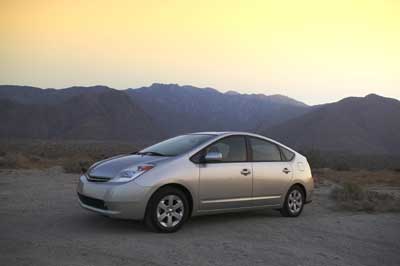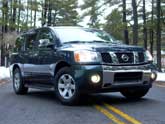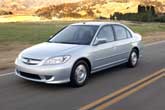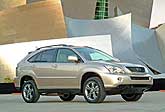Recent Articles
Popular Makes
Body Types
The Big Vehicle Goodbye?
High Gas Prices Seem to be Fueling Very Different Car Buying Intentions Online

For the first time in recent years, the price at the gas pump - and the specter of higher prices to come - has spurred a significant online shift in car buyer preferences, away from larger vehicles and toward smaller, more fuel-efficient cars. Vehicles such as the Ford F-150, the Chevrolet Tahoe, and other large SUVs such as the Nissan Armada and Toyota Sequoia - perennial favorites among online shoppers -- have suffered double-digit declines while at the same time, smaller more fuel-efficient cars such as the Honda Civic, Mazda3 and Toyota Prius have enjoyed robust growth. The shift is also apparent in the types of SUVs people are requesting - smaller SUVs have remained relatively stable, while large SUVs have declined sharply. It doesn't mean that Suburbans are going the way of the dinosaur - at least not yet, and probably not ever. Most automakers are reporting robust sales for large vehicles, the result of an improving economy and continuing incentives. But in the face of increasing sales numbers, the online shift indicates that shoppers are placing a higher emphasis on fuel economy during their buying decision, that there has been widespread adoption of hybrid vehicles, and that fuel economy is no longer solely a "pocketbook" issue, as people are recognizing the value of using fuel wisely.
Higher Emphasis on Fuel Economy
During the first 6 months of 2004, online shoppers have flocked to high mileage vehicles such as the Honda Civic, Mazda3, Saturn Ion and the Toyota Prius. Since January, the Honda Civic has gained ground in Autobytel's Consumer Choice overall rankings, from fifth to second, becoming one of the most popular online vehicles in terms of requests. That's ahead of longtime favorites the Ford F-150, Toyota Camry and Nissan Altima. The Mazda3 also broke into the overall Consumer Choice rankings for the first time, right next to its stable mate, the larger Mazda6. The car's modern and aggressive designs, combined with its fuel economy, are likely reasons why the 3 has gained strong interest with online shoppers. According to a recent survey of Autobytel dealers, 33% said that fuel efficiency outweighed brand, styling, performance, safety and roominess as a consumer buying consideration, and 82% said their customers are more interested in fuel-efficiency and/or fuel-efficient vehicles than they were a year ago. A majority of dealers also said that they're now having a harder time moving SUVs/trucks than a year ago, despite hefty incentives on many of the larger domestics, and 45 percent said that they are adding/will soon add more fuel-friendly vehicles to their inventory mix at the expense of larger trucks/SUVs.

Fading SUVs
And what the dealers say is coming is unfolding now online -- small vehicles are gaining favor with online shoppers while large foreign and domestic trucks and SUVs are being pummeled. The Ford F-150, America's favorite truck both on and offline, dropped to third in the overall standings, and dropped a 12 percent drop between the first and second quarter of 2004. Compared to SUVs, the F-150 did well: The Chevrolet Tahoe fell 27 percent, and the Hummer H2 - the darling of the utility set - fell an astonishing 47 percent. It wasn't that long ago that the Hummer H2 was one of the most popular vehicles on the road. In 2003, the MINI and Hummer tied for the largest overall increase in requests-to-buy among Autobytel shoppers. Since then, online requests to purchase the MINI Cooper are up 61% and requests down 21% for the Hummer H2. The MINI's remarkable ascent over the stagnant Hummer defies recent incentives on the H2 and the pending launch of a Cooper convertible, which would presumably initiate a "wait-and-see" period for many prospective MINI buyers. The Nissan Armada, did not get to enjoy the new vehicle honeymoon for long: vehicle requests for the Armada fell 20 percent, and the Toyota Sequoia dropped 12 percent compared to first quarter requests.

Hybrid Reaches the Heartland
It's no longer for the jet set, environmentalists or college students. Hybrid vehicles are in demand from all corners, and the most popular of all - in fact, the most popular vehicle online - is the new Toyota Prius. Rebuilt last year into a larger, sexier car with a more sophisticated hybrid system is up 41 percent from the first quarter. Even the Insight, the futuristic two-seater first to these shores with a hybrid powerplant, is enjoying a renaissance: compared to the first quarter, Insight vehicle requests are up 30 percent, trailing only the Prius and the Volkswagen Jetta (31 percent) in percentage growth, quarter to quarter. The online demand for these vehicles echoes the offline phenomenon of the Ford Escape Hybrid, the first and only hybrid SUV. Despite a price tag of more than $3,000 over the regular V6 Escape, there is a waiting list for the hybrid SUV.
It won't be by itself for long. Toyota will soon be debuting the Lexus 400h, a hybrid version of the RX330, and right behind that will come the Highlander hybrid. General Motors also plans to debut several hybrids, including the Saturn VUE and Chevrolet Tahoe. Honda is planning to debut the hybrid Accord later this year, and Nissan - in partnership with Toyota - has announced plans to build a 2007 Altima hybrid. The word is out about hybrids. And judging from the decline in large vehicle requests, we will likely see a broad selection of large vehicle hybrids in the near future. After all, who wouldn't buy an F-150 or a Sequoia that gets 50 percent better gas mileage and as-good if not better towing and hauling capability?

Save the World
Save the World, Save a Gallon The success of the Prius also indicates another shift in online shopper attitude. It's not just about saving money anymore. It's about conservation. Another Autobytel survey, which queried 3,000 online researchers, found that 44 percent will shop for a smaller vehicle with greater fuel efficiency, 60 percent said they would sacrifice interior space and performance for a more fuel-efficient, and 55 percent of Democrats and Republicans said they would consider a hybrid for their next vehicle purchase. It's not a surprise. With conflicts in the Middle East and issues of oil supply and demand commanding our attention, people are looking hard at the MPG and thinking about what they really need before deciding what to buy. And though they may end up purchasing that SUV anyway, the fact that their intent was to buy down in size and up in fuel economy indicates a potential shift in how and why people buy the cars they do.
